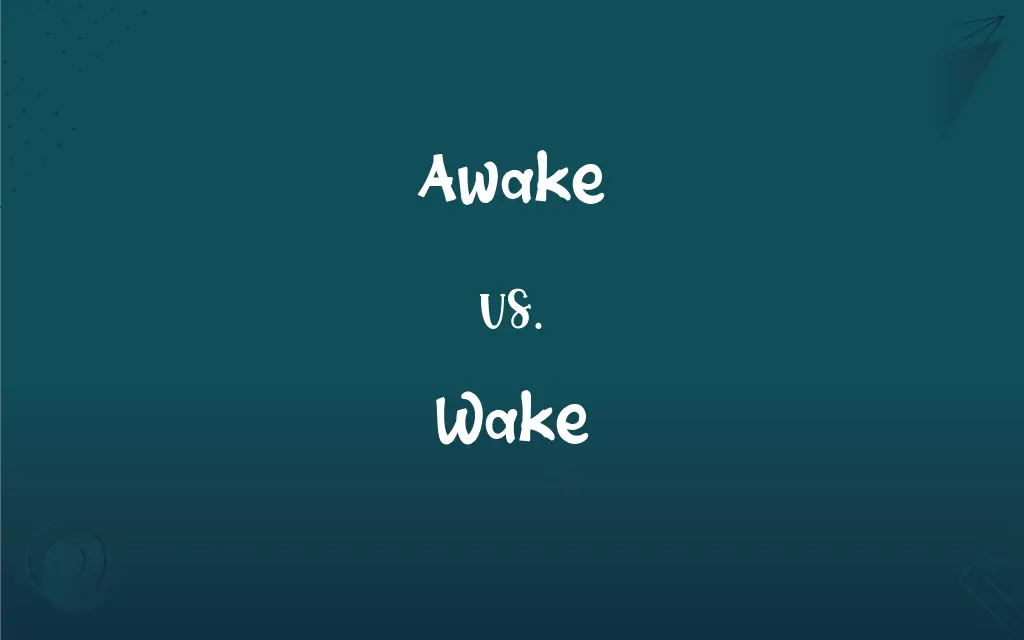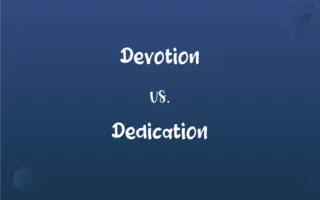Awake vs. Wake: What's the Difference?
Edited by Harlon Moss || By Janet White || Published on December 11, 2023
Awake is a state of being alert or not sleeping, while wake can mean either to stop sleeping or to cause someone to stop sleeping.

Key Differences
Awake primarily describes a state of not being asleep, indicating alertness and consciousness, whereas wake is a verb that means to stop sleeping or to rouse someone from sleep.
Awake can be used as both a verb and an adjective, e.g., "I am awake" or "She awoke suddenly," while wake is predominantly a verb, as in "to wake up" or "to wake someone."
In its adjective form, awake implies a state of readiness or vigilance, while wake as a verb emphasizes the action of becoming alert or rousing others.
Awake can also imply becoming aware of something, beyond just waking from sleep, while wake is often used in the context of ending sleep or starting the day.
The usage of awake is often more formal or literary, whereas wake is more commonly used in everyday speech, especially in phrases like "wake up."
ADVERTISEMENT
Comparison Chart
Part of Speech
Adjective and verb
Verb
Primary Meaning
Being not asleep, alert
The act of stopping sleeping
Secondary Meaning
Becoming aware
Rousing someone else from sleep
Usage Context
More formal or literary
More common in everyday speech
Example Phrase
"I am fully awake"
"Wake up in the morning"
ADVERTISEMENT
Awake and Wake Definitions
Awake
To stop sleeping; to become alert.
He awoke at dawn.
Wake
To cease to sleep; to become awake.
I wake up early every morning.
Awake
Not asleep; fully conscious.
She was awake all night thinking.
Wake
To become conscious of something.
Wake to the dangers of climate change.
Awake
To become aware or cognizant of something.
She awoke to the realities of life.
Wake
To hold a vigil beside someone who has died.
They held a wake for their grandfather.
Awake
To stir up or excite.
The speech awoke their enthusiasm.
Wake
To rouse someone from sleep.
Don't wake the baby.
Awake
To rouse from a state of inactivity.
The noise awoke memories of his childhood.
Wake
The aftermath or consequences of an event.
In the wake of the storm, many were left homeless.
Awake
To rouse from sleep; waken
"It was almost dark when the sound of crickets awoke her" (Jonathan Safran Foer).
Wake
To cease to sleep; become awake
Overslept and woke late.
Awake
To make aware of
The report awoke him to the possibilities of a compromise.
Wake
To stay awake
Bears wake for spring, summer, and fall and hibernate for the winter.
FAQs
Can awake be used as a verb?
Yes, in the sense of becoming alert or conscious.
Are awake and wake interchangeable?
Sometimes, but their nuances can differ.
What does wake mean?
Wake refers to the act of stopping sleeping or rousing someone from sleep.
Is wake used as a noun?
Yes, but in a different context, like in the aftermath of an event.
Which is more formal, awake or wake?
Awake is often considered more formal.
Does awake have a literary usage?
Yes, it's often used in a literary or formal context.
What does awake mean?
Awake describes being not asleep or becoming conscious.
Can wake mean to hold a vigil?
Yes, but this is a different noun usage of wake.
Does wake have a past tense?
Yes, the past tense is "woke" or "waked."
Can awake imply mental awareness?
Yes, it can imply becoming aware of something beyond waking up.
Is wake often used in everyday language?
Yes, especially in phrases like "wake up."
Is awake used in the phrase ‘wake up’?
No, wake up uses the verb form of wake.
Can wake be used in a metaphorical sense?
Yes, especially in phrases like "in the wake of."
Do awake and wake have different origins?
Yes, they come from different Old English roots.
Is awake used more in writing than speaking?
Often, especially in more formal or descriptive writing.
Can awake be used in the imperative form?
Not commonly, as it's more descriptive than directive.
Is wake appropriate in formal documents?
Yes, though it might depend on the context.
Can both words be used in expressions of alertness?
Yes, though awake is more likely to be used in this way.
Do awake and wake have different connotations in poetry?
Yes, awake might be used for more evocative or metaphorical meanings, while wake is more direct.
Are there idiomatic uses of awake and wake?
Yes, especially for wake, like "wake-up call."
About Author
Written by
Janet WhiteJanet White has been an esteemed writer and blogger for Difference Wiki. Holding a Master's degree in Science and Medical Journalism from the prestigious Boston University, she has consistently demonstrated her expertise and passion for her field. When she's not immersed in her work, Janet relishes her time exercising, delving into a good book, and cherishing moments with friends and family.
Edited by
Harlon MossHarlon is a seasoned quality moderator and accomplished content writer for Difference Wiki. An alumnus of the prestigious University of California, he earned his degree in Computer Science. Leveraging his academic background, Harlon brings a meticulous and informed perspective to his work, ensuring content accuracy and excellence.






































































